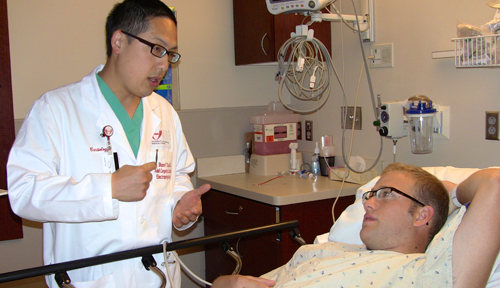Taylor Harms has a perspective many of his medical school classmates don’t – – the perspective of a patient. And not just any patient — one who’s had open heart surgery twice.
He had surgery to repair a narrowed aorta, the body’s main blood vessel, when he was eight.
But Harms also had a bicuspid aortic valve — one of the heart’s valves developed only two leaflets instead of three. The stress on his heart meant that its main pumping chamber was much larger than it should have been.
Worsening condition
This July, although Harms was feeling fine, his blood pressure was going up. His condition had worsened.
“Blood was leaking back through that valve,” explained Shane Tsai, M.D., cardiologist and congenital heart disease specialist. “Instead of being ejected into the body, the blood falls back into the heart’s main pumping chamber.”
Harms needed open heart surgery — again.
“We would prefer to get someone early in the stage of their disease,” said Kim Duncan, M.D., professor of cardiovascular and thoracic surgery at UNMC. “We can do a procedure and preserve cardiac function for a much longer period of time.”
Dr. Duncan performed surgery on Harms in mid-July. He replaced the aortic valve with a mechanical valve they hope will last for decades. He also removed the narrow portion of Harms’ aorta.
Patients becoming more common
Dr. Tsai said patients like Harms will become more common as medical advances continue.
“As medicine and surgery have gotten better, we have more survivors,” he said. “A few decades ago, 90 percent of these babies may not have survived into adulthood. We now expect that 85 percent of children born with these heart problems will survive into adulthood.”
But just because they live to be adults does not mean they are free from heart trouble. That’s where the medical center’s program shows its importance.
Because of UNMC Physicians’ collaboration with Children’s Hospital and Medical Center, Dr. Tsai said medical center physicians are uniquely positioned to care for these patients throughout their lives.
“We see them when they’re babies and through adulthood,” he said.
Harms is recovering. In one week, he’ll begin his second year of medical school. He’s already learned a lot about what it’s like to be a patient. He has a little time to decide what specialty he’ll follow as an M.D.
“I’m thinking maybe cancer,” Harms says. “I think cardiology may be a little too close.”

I am amazed at how far heart surgery and procedures have come. My youngest son, who will be nine on Saturday, had a vavuloplasty when he was 10 weeks old for a severe pulmonary valve stenosis. I am grateful or the relationships between doctors and the learning opportunities at UNMC! For now he is doing well, we will see what comes with added time, body mass, sports, and most importantly technology.
I have also had surgery twice and have the same valve and root. How do I reach this guy to talk about our ordeals ?